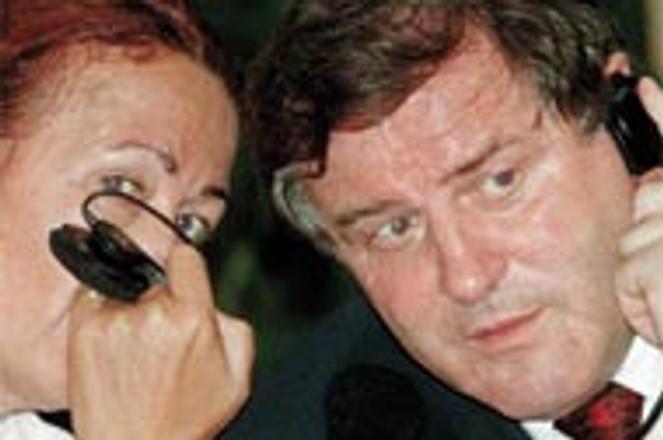Premier Vladimír Mečiar's repatriation call for ethnic Slovaks and Hungarians has caused gov't officials like spokeswoman Magda Pospíšilová (at left) to beat a fast public retreat.TASR
Slovak Prime Minister Vladimír Mečiar's proposal to his Hungarian counterpart, Gyula Horn, at their August 15 summit in Györ to initiate a mass exchange of citizens has evoked sad memories about mass repatriation after World War II, provoked anger on both sides of the border, and appears badly timed as the European Union makes a final decision on Slovakia's application in December.
"I proposed that the free movement of people from the Slovak and Hungarian republics be established, including changes in citizenship," Mečiar told a crowd of his supporters at his party's regular monthly rally in Bratislava on September 4, "so that if Slovaks who live in Hungary want to live in Slovakia, the Hungarian government should commit to releasing them [from citizenship], and we will commit to accepting them [as our citizens]."
"I asked conversely that the Hungarian government commit to accepting those [Slovak] citizens of Hungarian nationality who don't want to live in Slovakia...under the condition that neither side must exert pressure on these people to leave other than willingly," Mečiar continued. It was the first time that Mečiar publicly mentioned his proposal, as neither leader mentioned it after meeting in Györ.
A day later, Horn confirmed Mečiar's proposal in an interview for Hungarian state radio, but sounded bitter it had been made public. "I got furious that he could make such a proposal, and I refused. I told him that I'm not willing to even negotiate about his proposal and suggested he forget about it. [The topic was on the table for] several minutes and it never reappeared."
Also, Horn commented that the proposal evoked flashbacks festering in people's minds for more than half a century. "This brings to mind sad and tragic memories," he said, referring to the forced exchanges of population between the two states before and after World War II.
Back then, large masses of people were exchanged in two tidal waves, the first after Czechoslovakia's territory was crippled by the 1938 Munich agreement, and the second after 1945 when the country was re-established in its original borders set up in 1918.
The twin changes to the Slovak-Hungarian line triggered two mass exoduses euphemized on both sides as "repatriation."
The more brutal was the post-war one. From 1945-1948, after the Czechoslovak and Hungarian governments had agreed to a mass exchange, 73,000 ethnic Slovaks were moved from Hungary to Slovakia and 74,000 ethnic Hungarians left Slovakia for Hungary. The remaining Hungarian Slovaks who stayed in Slovakia were asked to renounce their nationality or be denied, among other things, the right to vote. Many Hungarian Slovaks, not wanting to move, renounced their Hungarian nationality for peace. But bitter memories still course through the minds of both ethnic groups as these not-so-distant days remain present topics of conversation at the dinner table.
That's why Mečiar's proposal left most ordinary people stunned. Hungarians living in Slovakia condemned it. "It happened several times in the past, and it always brought only trouble. We are at home in Slovakia, and we want to live here and be happy," said Edita Fabiánová, secretary of the Hungarian cultural organization Csemadok in the southern Slovak town of Rožňava.
Election campaign booster?
Political observers in Slovakia claimed that Mečiar is "playing the Hungarian card" in advance of next fall's national elections by playing on Slovak voters' historic fear of Hungarians, rooted in the centuries-long Hungarian rule over Slovakia.
Yet that strategy would have the HZDS competing for the same voters of one of its coalition partners, the Slovak National Party (SNS), who supported the idea. "In the current situation, characterized by some Hungarian minority representatives' arrogance against Slovakia, the SNS sees enabling [the minority's] malcontents to go back to their motherland as a viable solution to today's confrontational situation," said Ján Slota, the SNS's chairman.
"It [the strategy] is suggested not only by the premier's 'statesman-like initiative' at the talks with Horn, but also by the fact that he boasted about it in front of [his own] roaring crowds," wrote Marián Leško, author of a bestseller called "Mečiar and Mečiarism" and a columnist for the anti-government Sme.
According to an August opinion poll conducted by the MVK agency, Mečiar's Movement for a Democratic Slovakia (HZDS) is trailing its strongest opposition rival, the newly-created five opposition party alliance, the Slovak Democratic Coalition (SDK), by nearly 10 percent .
Bad PR, timing
Once the world press got wind of the idea, the government's press office backpedaled furiously, explaining Mečiar's proposal as copycatting the European Union's (EU) idea of free movement of persons.
"The government's press office emphatically refuses attempts to interpret [the proposal] while using expressions such as "resettling" or "repatriation" which have always been totally unacceptable for the Slovak prime minister in this context," the statement reads. "The idea of free movement of persons including free choice of citizenship was presented to the Hungarian side as a suggestion for a discussion which would in the future enable much freer movement of both states' citizens, in lines with an ongoing integration of our region into Europe."
The idea, nor the government's later explanation, likely scored negative public relations points with the EU.
"I support the negative evaluation of Slovakia by the European Commission," Jan Marinus Wiersma, the European Parliament's rapporteur assessing Slovakia's status in the integration process, told the Czech press agency ČTK one week after Mečiar publicly aired his proposal.
Wiersma added that if the European Council at its December summit decides to begin accession talks with all applicants at once, he will suggest that Slovakia be excluded from this process according to a 10-1+1 model, which in Brussels diplomatic jargon means all European applicants minus Slovakia, plus Cyprus.

